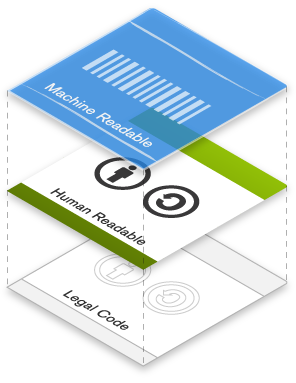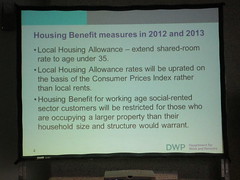
The police came at four in the morning with a battering ram to the Cruz home in Minneapolis, Minnesota. And that was only one of the five eviction attempts required to finally claim the home for the banks.
“After we had been peacefully occupying this house for over a month without any incidents, then they come in with a battering ram and blame us for disturbing the peace,” said Nick Espinosa, one of the organizers with Occupy Homes Minnesota, which has taken the lead in saving local families from being put out on the street.
The battering ram was just adding insult to injury—the Cruz family was being evicted through no fault of their own, because PNC bank had made a mistake in processing their payments. The Occupy Homes crew moved into the house to try and defend it while the sheriff's department came once and then twice to evict.
“We had people who were locking down to concrete barrels and other devices to prevent them from evicting the house and we were mobilizing people to come and defend the house,” Espinosa said. Over the course of the five eviction attempts there were 26 arrests. The last time Espinosa was arrested along with 14 others and charged with rioting in the third degree, defined as “Violence or the threat of violence to people or property when more than three are gathered.”
They face up to two years in prison. Espinosa noted, “There are 15 people now facing riot charges who were arrested doing nonviolent civil disobedience, basically sitting down and linking arms on the front steps of a house.”
“The chief of police was there the night I was arrested. Four other officers stepped over us as we were sitting in front of the door,” he continued. “He stepped directly on top of us, on our shoulders and necks, to come into the house.” The previous day police had grabbed protesters by the neck to move them out of the way, and women activists complained of feeling sexually assaulted, having been groped by the police. “Somebody's hand went up one of my friends' shirts,” Espinosa said. One of the Cruzes' neighbors was arrested while standing on the sidewalk outside her house holding up a sign in support of Occupy Homes.
The battle to save the Cruz home is just one of many being fought by organizers around the country to stop the epidemic of foreclosures, many rooted in fraud or bank error – foreclosures that continue to shake the economy four years after the housing bubble burst. No high-level bankers, of course, have been charged with any crime for the systemic fraud and misconduct that led to the economy's near collapse; but peaceful community activists standing up for their neighbors face serious jail time.
“The city has the option to use their discretion about how they react to situations like this,” Espinosa said. “There are plenty of other crimes that they could be pursuing. They don't have to come and respond to that issue of people being in this house, that's technically trespassing.”
Evicted by Bank Error
“We had made the sheriffs very aware of the situation and said don't get involved in this, just let it be, we're working out a solution,” Espinosa explained.
PNC Bank, the mortgage lender, failed to process an online payment made by the Cruz family—and then demanded two months' worth to make up for it. The family couldn't come up with the money, and the bank moved to foreclose.
“We began working with a local nonprofit that was supposed to be working out a loan modification,” Alejandra Cruz explained in a blog post that accompanied a Change.org petition to save her family's home. The bank told the family they would work on a solution, but the family was served with an eviction notice anyway.
Alejandra and David Cruz are college students and DREAM act organizers; their family is from Mexico City. “Until now,” Alejandra pointed out, “many families in the Latino community have been afraid to stand up when they are being mistreated by the banks that fraudulently foreclose on families across the country. The banks have used this fear and manipulation of a complicated legal system to profit from honest, hardworking people.”
“I believe what they were doing is saying they were negotiating and then with the other hand pushing forward with the eviction so they didn't have any responsibility to work with the family,” Espinosa said.
This process is so common that it has a name: dual tracking. It's also been called out by lawmakers and attorneys general as unfair and deceptive to homeowners. "We don't think that a homeowner who is making a good-faith effort to work through their troubled mortgage should have the roof ripped out from over them while they are negotiating, or trying to negotiate," Geoff Greenwood, a spokesman for Iowa Atty. Gen. Tom Miller, told the Los Angeles Times last year.
Yet the process continues, and families across the country struggle with it every day, often without the support of neighbors and organizers willing to put their bodies on the line and risk arrest to keep them in their homes.
Alejandra and David took a road trip across the country in June to PNC's headquarters, but the bank's executives refused to bend. (Last year, the Office of the Comptroller of the Currency found PNC, one of the nation's largest banks, to have “unsafe and unsound” mortgage servicing and foreclosure practices, including robo-signing.)
For now, the Cruzes are living in an apartment and continue to pressure the bank to work out a solution to get them back in their home (which was bought by Freddie Mac at a sheriff's sale, and remains boarded up). They continue, as well, to organize with Occupy Homes in support of other families.
The system is stacked against families like these, though—banks have expensive lawyers and go through this regularly, while families struggling to pay the bills have little help. “The legal system is not the battleground for us to win against the banks,” Espinosa said. “The way we're going to do that is through popular pressure and people power.”
Keeping Up the Fight
Espinosa considers the arrests and riot charges an escalation by the city to try and stifle their organizing and direct action. “For them it's a political issue that exposes the fact that they're complicit in all these foreclosures and that if they weren't sending the police with our city resources to come and evict families who are being thrown out through no fault of their own, the banking system would not continue to profit off of tearing communities apart.”
“The city is trying to make an example out of people, especially core organizers, by using trumped-up charges to try to force us to take a worse plea deal,” he continued.
He and others have been offered plea deals, but they refuse to take the deals unless the riot charges are dropped against all of them. “We're using court solidarity to demand that everybody gets a fair deal,” he explained. “We're ultimately asking them to drop all the charges because we think it's ridiculous that they're going after peaceful protesters protecting their neighbors instead of the banks who crashed our economy through massive fraud.”
Minneapolis's mayor, R.T. Rybak, had released a statement before the arrests saying “The City is not in the foreclosure business,” and “The City plays a limited role to protect public safety.” Yet, Espinosa noted, the normally-progressive mayor's words didn't match his actions. “If you cared about people and cared about doing something about the foreclosure crisis, your priorities would not be trying to intimidate people with bogus riot charges.”
“He has the power to direct the police not to enforce the evictions, he has the power to publicly state that banks should be negotiating with people and we couldn't get him to do that,” Espinosa continued. “I'd much rather be going after the bank than going after the mayor, but when he puts himself between our ability to do the work and acts as a protector of the bank then he puts himself in the crossfire and becomes a political target.”
Occupy movements around the country have dealt with this problem: some argue that the movement should focus solely on the banks, while others note that it's impossible to do so when the political and legal systems enforce the banks' will and offer little recourse to everyday people.
However, Espinosa noted, there's an upside to the ridiculous charges and police brutality (not to mention wasted resources in keeping the home under guard and prosecuting peaceful protesters). Local support for their movement has grown, from neighbors up and down the Cruzes' block to local celebrity Brother Ali, a hip-hop artist who had been a supporter of Occupy Homes for a while but took his first arrest as part of the civil disobedience at the Cruz home. Because of canvassing the block for support, Espinosa said, Occupy Homes also found another homeowner fighting foreclosure and helped him get a mortgage modification. “A lot of new people have been galvanized by the outrageous nature of these charges,” he noted.
Occupy Homes Minnesota continues to fight for local families, having just celebrated Monique White's victory and the victory of Espinosa's own mother in keeping their homes. Despite the distraction that the ongoing struggle over criminal charges poses, they remain determined to win both the right for the Cruzes to return to their home and their legal battles.
“If they want to take people to trial and try to convince a jury that we were rioting by sitting down and linking arms,” Espinosa said, “we can do that.”
“After we had been peacefully occupying this house for over a month without any incidents, then they come in with a battering ram and blame us for disturbing the peace,” said Nick Espinosa, one of the organizers with Occupy Homes Minnesota, which has taken the lead in saving local families from being put out on the street.
The battering ram was just adding insult to injury—the Cruz family was being evicted through no fault of their own, because PNC bank had made a mistake in processing their payments. The Occupy Homes crew moved into the house to try and defend it while the sheriff's department came once and then twice to evict.
“We had people who were locking down to concrete barrels and other devices to prevent them from evicting the house and we were mobilizing people to come and defend the house,” Espinosa said. Over the course of the five eviction attempts there were 26 arrests. The last time Espinosa was arrested along with 14 others and charged with rioting in the third degree, defined as “Violence or the threat of violence to people or property when more than three are gathered.”
They face up to two years in prison. Espinosa noted, “There are 15 people now facing riot charges who were arrested doing nonviolent civil disobedience, basically sitting down and linking arms on the front steps of a house.”
“The chief of police was there the night I was arrested. Four other officers stepped over us as we were sitting in front of the door,” he continued. “He stepped directly on top of us, on our shoulders and necks, to come into the house.” The previous day police had grabbed protesters by the neck to move them out of the way, and women activists complained of feeling sexually assaulted, having been groped by the police. “Somebody's hand went up one of my friends' shirts,” Espinosa said. One of the Cruzes' neighbors was arrested while standing on the sidewalk outside her house holding up a sign in support of Occupy Homes.
The battle to save the Cruz home is just one of many being fought by organizers around the country to stop the epidemic of foreclosures, many rooted in fraud or bank error – foreclosures that continue to shake the economy four years after the housing bubble burst. No high-level bankers, of course, have been charged with any crime for the systemic fraud and misconduct that led to the economy's near collapse; but peaceful community activists standing up for their neighbors face serious jail time.
“The city has the option to use their discretion about how they react to situations like this,” Espinosa said. “There are plenty of other crimes that they could be pursuing. They don't have to come and respond to that issue of people being in this house, that's technically trespassing.”
Evicted by Bank Error
“We had made the sheriffs very aware of the situation and said don't get involved in this, just let it be, we're working out a solution,” Espinosa explained.
PNC Bank, the mortgage lender, failed to process an online payment made by the Cruz family—and then demanded two months' worth to make up for it. The family couldn't come up with the money, and the bank moved to foreclose.
“We began working with a local nonprofit that was supposed to be working out a loan modification,” Alejandra Cruz explained in a blog post that accompanied a Change.org petition to save her family's home. The bank told the family they would work on a solution, but the family was served with an eviction notice anyway.
Alejandra and David Cruz are college students and DREAM act organizers; their family is from Mexico City. “Until now,” Alejandra pointed out, “many families in the Latino community have been afraid to stand up when they are being mistreated by the banks that fraudulently foreclose on families across the country. The banks have used this fear and manipulation of a complicated legal system to profit from honest, hardworking people.”
“I believe what they were doing is saying they were negotiating and then with the other hand pushing forward with the eviction so they didn't have any responsibility to work with the family,” Espinosa said.
This process is so common that it has a name: dual tracking. It's also been called out by lawmakers and attorneys general as unfair and deceptive to homeowners. "We don't think that a homeowner who is making a good-faith effort to work through their troubled mortgage should have the roof ripped out from over them while they are negotiating, or trying to negotiate," Geoff Greenwood, a spokesman for Iowa Atty. Gen. Tom Miller, told the Los Angeles Times last year.
Yet the process continues, and families across the country struggle with it every day, often without the support of neighbors and organizers willing to put their bodies on the line and risk arrest to keep them in their homes.
Alejandra and David took a road trip across the country in June to PNC's headquarters, but the bank's executives refused to bend. (Last year, the Office of the Comptroller of the Currency found PNC, one of the nation's largest banks, to have “unsafe and unsound” mortgage servicing and foreclosure practices, including robo-signing.)
For now, the Cruzes are living in an apartment and continue to pressure the bank to work out a solution to get them back in their home (which was bought by Freddie Mac at a sheriff's sale, and remains boarded up). They continue, as well, to organize with Occupy Homes in support of other families.
The system is stacked against families like these, though—banks have expensive lawyers and go through this regularly, while families struggling to pay the bills have little help. “The legal system is not the battleground for us to win against the banks,” Espinosa said. “The way we're going to do that is through popular pressure and people power.”
Keeping Up the Fight
Espinosa considers the arrests and riot charges an escalation by the city to try and stifle their organizing and direct action. “For them it's a political issue that exposes the fact that they're complicit in all these foreclosures and that if they weren't sending the police with our city resources to come and evict families who are being thrown out through no fault of their own, the banking system would not continue to profit off of tearing communities apart.”
“The city is trying to make an example out of people, especially core organizers, by using trumped-up charges to try to force us to take a worse plea deal,” he continued.
He and others have been offered plea deals, but they refuse to take the deals unless the riot charges are dropped against all of them. “We're using court solidarity to demand that everybody gets a fair deal,” he explained. “We're ultimately asking them to drop all the charges because we think it's ridiculous that they're going after peaceful protesters protecting their neighbors instead of the banks who crashed our economy through massive fraud.”
Minneapolis's mayor, R.T. Rybak, had released a statement before the arrests saying “The City is not in the foreclosure business,” and “The City plays a limited role to protect public safety.” Yet, Espinosa noted, the normally-progressive mayor's words didn't match his actions. “If you cared about people and cared about doing something about the foreclosure crisis, your priorities would not be trying to intimidate people with bogus riot charges.”
“He has the power to direct the police not to enforce the evictions, he has the power to publicly state that banks should be negotiating with people and we couldn't get him to do that,” Espinosa continued. “I'd much rather be going after the bank than going after the mayor, but when he puts himself between our ability to do the work and acts as a protector of the bank then he puts himself in the crossfire and becomes a political target.”
Occupy movements around the country have dealt with this problem: some argue that the movement should focus solely on the banks, while others note that it's impossible to do so when the political and legal systems enforce the banks' will and offer little recourse to everyday people.
However, Espinosa noted, there's an upside to the ridiculous charges and police brutality (not to mention wasted resources in keeping the home under guard and prosecuting peaceful protesters). Local support for their movement has grown, from neighbors up and down the Cruzes' block to local celebrity Brother Ali, a hip-hop artist who had been a supporter of Occupy Homes for a while but took his first arrest as part of the civil disobedience at the Cruz home. Because of canvassing the block for support, Espinosa said, Occupy Homes also found another homeowner fighting foreclosure and helped him get a mortgage modification. “A lot of new people have been galvanized by the outrageous nature of these charges,” he noted.
Occupy Homes Minnesota continues to fight for local families, having just celebrated Monique White's victory and the victory of Espinosa's own mother in keeping their homes. Despite the distraction that the ongoing struggle over criminal charges poses, they remain determined to win both the right for the Cruzes to return to their home and their legal battles.
“If they want to take people to trial and try to convince a jury that we were rioting by sitting down and linking arms,” Espinosa said, “we can do that.”
Tweet your opinion at #AceNewsServices or email your opinion to me at News and Views







